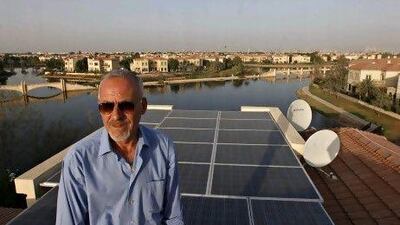DUBAI // There is little to indicate that Tony Caden's house in the Jumeirah Islands is, in its own small way, at the forefront of an energy revolution.
Hidden from the street, 38 solar panels power the house and a 20-tonne chiller unit cools it.
The solar array has also allowed Mr Caden to cut off the controversial district cooling provided by Nakheel.
The gated community of Jumeirah Islands has had a long-running row with the developer over the cost of the cooling it provides; a cost that has nearly doubled over the past year.
"I've totally gone off district cooling from last month," said Mr Caden, a Briton who has lived in Dubai for 15 years and in 2005 became one of the first homeowners in the development.
"I was ecstatic when this was installed because it cuts me off from Nakheel. It's invaluable because it gives me control over the quality of my life.
"As soon as Nakheel put up the price of district cooling last year to Dh1.4 per unit, that started me looking for alternatives because the cost was astronomical."
Mr Caden, 60, estimated that he would recover his Dh176,500 investment in energy savings over the next five years.
But it was not just the cost that led him to go solar. He also wanted to reduce his carbon footprint.
"That was one of my aims," he said. "It's not just to keep the cost down. It's nice to know that you can increase the use of alternative energy."
Nakheel did not respond to questions on whether it would support the initiative by Mr Caden, who runs a service company in the oil and gas industry.
Legally he is within his rights as the owner of a freehold property, said Shahram Safai, the head of property at Afridi and Angell legal consultants.
"In the end, district cooling is a service and someone cannot force you to take a service if you don't want it," Mr Safai said.
"If it's an intention to have a cost-effective way to cool the villa, I don't think he can be prevented from doing so as long as, aesthetically, you have not changed how it looks to your neighbours."
He said even if there were a clause requiring that all owners must use district cooling, it was unlikely it could be legally enforced because it is a freehold property, meaning Mr Caden has the full right of ownership.
The sloping-roofed villa looks like any other well-tended home in the community. Mr Caden has stuck to the rules that stipulate no external changes to the villa, and the panels cannot be seen from the front of the house.
But the rules have also prevented his home from being entirely reliant on solar power.
The solar panels fit into empty spaces above the garage ceiling and the roof. The green energy produces between 50 and 70 kilowatts during daylight hours.
But Mr Caden's property uses 90kw of power over a 24-hour period, leaving a deficit of 20 to 40kw a day.
The solar power is supported by energy from the Dubai Electricity and Water Authority (Dewa) during the day, and Dewa is the sole source of power when the solar panels stop working at night.
"The system sometimes draws power from Dewa, and sometimes it won't when there is enough energy in the house," said James Alexander, who runs Solar Sun 4 Life UK, the British-certified solar installation company that set up the unit.
"The solar panels in the morning absorb UV [ultraviolet] radiation and, as it gets to lunchtime, these are producing the most energy when maximum energy is needed to run the chiller.
"From the solar panels it goes to the inverter and gets converted into AC electric power, and then it is distributed throughout the house.
"If your chiller is not being used, then power is available to run other appliances. It can go to the fridge, the pool, the cooker, the lights."
Community rules did not permit terracotta solar panels to be fitted on Mr Caden's roof. They would have generated enough power to run the whole house all day.
The villa has also been painted with a special coating designed to reflect the sun's rays, producing a cooling effect.
"We had to conform to the regulations so we haven't changed the aesthetics," Mr Alexander said.
"Once the rules relax in favour of solar, then we can put terracotta solar panels of the same colour as the tiles and can fully run the house."
Mr Caden's move has raised considerable interest with residents unhappy with the varying district-cooling charges.
"Four or five bills of Dh5,000 to Dh6,000 will start biting people, as that's a huge increase," said Kamal Kotecha, another British national.
"In the end we are human beings. We will compare costs, and people will naturally look at alternatives like Tony has found."


